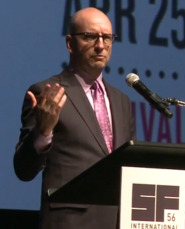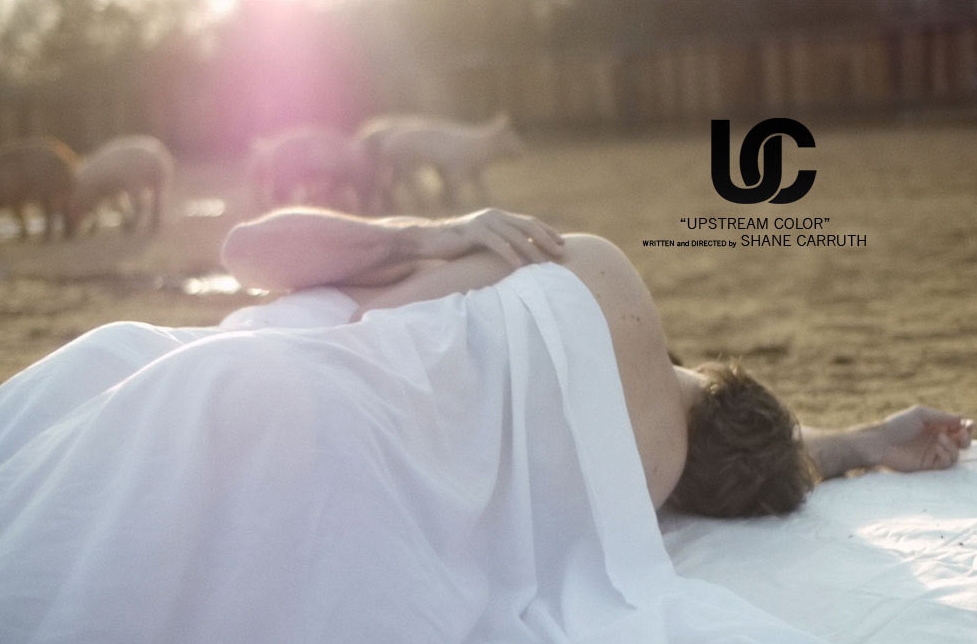 Hey everybody, it’s Tim, here to add my two cents to what has been, incontestably, the film story of the last few days: the sprawling, self-described “rant” delivered by Steven Soderbergh as his keynote speech on the State of Cinema at the San Francisco Film Festival on April 27. The San Francisco Film Society has made the video of his entire speech available, accompanied by a not-quite-accurate transcript; it’s worth checking it out in either form, though I found it easier to puzzle out what the director was getting at in the text version.
Hey everybody, it’s Tim, here to add my two cents to what has been, incontestably, the film story of the last few days: the sprawling, self-described “rant” delivered by Steven Soderbergh as his keynote speech on the State of Cinema at the San Francisco Film Festival on April 27. The San Francisco Film Society has made the video of his entire speech available, accompanied by a not-quite-accurate transcript; it’s worth checking it out in either form, though I found it easier to puzzle out what the director was getting at in the text version.
By all means, it takes some puzzling. I yield to no-one in my love of Soderbergh, but there’s no denying that his speech is very much a rambling, discursive piece, meant to be enjoyed as conversation, rather than analyzed closely for a structure it very much does not possess. It’s pure stream-of-consciousness (it wouldn’t be the least bit surprising to find out that it was predominately improvised), and that’s okay: anybody who has listened to one of Soderbergh’s DVD commentaries is well aware that when he gets to rambling, some very keen insights on the nature of the art form tend to come tumbling out...
That being said, I’m not entirely certain that his State of Cinema address ends up being especially keen. The entire speech hinges on his proclamation, about a third of the way through, that we’re getting too little “cinema” and too many “movies”. Which he first rather confusingly defines as: “a movie is something you see, and cinema is something that’s made.” As he refines the idea moving forward, it’s pretty clear that he’s talking more specifically that “movies” are mechanically proficient but largely impersonal (by which I gather that he means not just mindless popcorn entertainment, but also Oscar season prestige pictures), while “cinema” is anything made by someone with a clear individual perspective that they want to express, and sometimes that means that they make something bizarre and unwatchable; but only they could have made it, and it’s this idea of cinema-as-private-expression that captivates Soderbergh so much. The terminology is perhaps inapt, but the concepts are sound, mostly because they’re so familiar.
Frankly, it’s this middle sequence of the speech, where he lays out his moral argument, that Soderbergh is at his least interesting: the kaleidoscopic opening has the flow of a great conversationalist holding court over whatever crosses his mind, and the closing has great value that we’ll talk about presently. The middle, though, is nothing we haven’t heard, nothing that wasn’t being said as far back ago as the ‘40s: Hollywood is more concerned with making reliably mediocre product than servicing personal vision, and that’s bad.

Of course it’s bad, on the face of it (though unspoken in Soderbergh’s argument is the idea that just because something is personal and non-commercial, it is also interesting, and this is not inherently true: the aesthetic and thematic homogeneity of the “young urban whites” branch of American independent filmmaking demonstrates that). But the way Soderbergh mounts his argument is perhaps chiefly of interest to Soderbergh himself; the vibe is more “I regret how hard it is for me to make strange little pet projects on studio money now”, and not anything that necessarily applies to someone like Shane Carruth, one of the people Soderbergh specifically name-drops, whose recent Upstream Color, which makes DIY filmmaking part of its texture and theme, doesn’t obviously suggest that he’d take $10 million in Hollywood money even if it was offered.
It’s also not entirely clear what message we’re meant to take from this: that studios are afraid to take risks? That audiences are? The anecdote about how Side Effects couldn’t find an audience certainly suggests that even when the stars align, the people who go out to see movies have been so conditioned to only want to see the biggest, splashiest spectacle, not little character pieces, but outright blaming the audience for being too passive is a level of confrontation Soderbergh isn’t willing to go into, no matter how much it’s the obvious direction of his thoughts.

Certainly, it's not because the white people aren't pretty enough
Everything’s made up for in the stunning final passage of the speech, though, as he begins to sidle from aesthetic concerns to business ones, and lays out, in the clearest examples I have ever heard, exactly why the studios have embraced the salted-earth “summer tentpoles über alles” mindset that has grown increasingly dominant in the film industry over the last few decades and even just the last handful of years. Again, it’s not exactly revolutionary material: since big, expensive sequels reliably make money, the studios focus on those at the expense of more daring and/or smaller productions. But the on-the-ground way that this is all told, with the user-friendly recourse to monetary figures, brings that reality home. It makes not just the size of the problem, but also the intractability of it, comprehensible enough that it's considerably more objective and diagnostic than the mere rant he promised.
All of this is interleaved with strands that Soderbergh doesn’t follow-up, fascinating ideas that I deeply wish he’d explored more: the idea that filmgoers are stalled in a post-9/11 state of escapism, which he forgets about immediately, or his ideas for solving this problem that he’s so expertly identified. The closer the speech gets to its end, the more frustrating it becomes that he relies on such generalized positives in the face of such particular negatives. But this much is true: he’s begun a conversation from a much more analytical and thoughtful place than most end-of-cinema jeremiads are able to, and however vaguely expressed, the ideas he presents are much more worthy of development by filmmakers and filmgoers alike than mere complaints about how shallow popcorn movies have become.